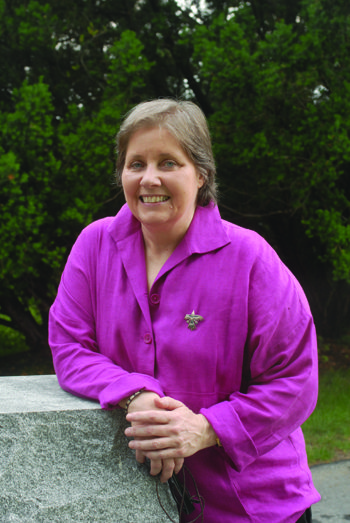One lesbian working to create acceptance within families.
Echoing a line from Pink’s song “Perfect,” Caitlin Ryan wants to “change the voices in the heads” of LGBT adolescents—she wants them to like themselves and she wants their families to like them, too. When Ryan talks about her work, you hear the fervor of a religious zealot balanced with the pragmatism of a world-class CEO.
“I feel a profound sense of commitment, but I struggle,” she admits. It’s a matter of faith to her, this belief that LGBT kids and their families really want and need one another—and so, as the founder of the Family Acceptance Project, revisiting preconceived messages about queerness is what she does, on the road across America, across the border into Latin America, and across the world.
It’s controversial work, especially in the current “it gets better” climate. “So many people working with LGBT adolescents were wounded by their families,” she explains. That has set a whole construct in motion where people working with LGBT adolescents view the families of those kids as the enemy, because that was their own experience.
“The messages we give our youth are pretty hopeless,” she asserts. Ryan understands where those messages are coming from; she just thinks there’s another message to deliver, one that reinforces the bonds of community and family. “What we really need to be doing is nurturing families, so they can nurture their kids.”
Ryan had decades of social work, community organizing and theoretical introspection to bolster her position and her mission. A graduate of the prestigious Smith College School for Social Work, she’s now got the alphabet after her name (PhD ACSW) to help make people listen. When Ryan first applied to other social work schools in the 1970s as an out lesbian who had worked on early LGBT health issues, they wouldn’t accept her. But she’s no mere clinician, peering at her subjects through a microscope. Her passion for queer kids and their families is what drives her.
“I’ve always been a thinker,” Ryan says. “I felt that I had to learn and absorb. But 40 years of being in the field has given me the ability to synthesize [those] ideas.” The Family Acceptance Project evolved out of that thoughtfulness. Years of working with families as a community organizer in Appalachia, and then in communities in Atlanta that were just being touched by the AIDS pandemic, has given her a multiplicity of ideas about how to fix the broken places.
Ryan sees today’s trend to isolate LGBT youth from pretty much everyone else as problematic. “We are all about creating separate spaces for youth. LGBT youth are being served today by separating them from their families.”
What they really need, insists Ryan—and she says that this is especially true for youth of color who are struggling with racism, and for girls who are struggling with sexism—is to feel linked to their own communities and families.
The work Ryan is doing isn’t just groundbreaking—it’s monumental. Before she did it, no one had actually studied what happens within families when adolescents come out. It’s complicated, but it doesn’t have to end in kids disowning their families or parents telling their kids that it’s wrong to be queer. But those who work with kids and families need re-education, Ryan asserts.
“Even providers today don’t understand,” she says. “They say, ‘Kids don’t really understand their identities,’ and this just supports the idea that many families have that this is just a phase. Families need to understand that this perception just makes kids feel bad about themselves and their identities.”
Ryan has traveled around the U.S. and done outreach in China, Latin America and Spain, teaching family intervention strategies to adolescent mental health and family services organizations. She gives families the information they need to understand their LGBT kids and to show them what their gender-variant children need. In the past year, she has trained about 15,000 people.
The training is vital, explains Ryan, because “messages that young people are receiving about their families are negative. They hear things like, ‘As a clinician, I know that your parents don’t understand you.’ Parents just need educating about how their negative feelings about gender variance are impacting their children,” she says.
There are many reasons to solidify the bond between LGBT youth and their families, and have family members deal with their negative feelings—especially if, for example, it is a family of color and the family is dealing with racism. “Once these families find out about our objective research, they start to realize that their negative attitude is actually undermining their kids. It’s a change maker.”
Ryan is at times overwhelmed by the sheer breadth of what she wants to accomplish. “This is the most hopeful work I have ever done, the most inspiring,” she says. Her goal to make LGBT kids and their families whole again, so that for them both it will indeed get better.
